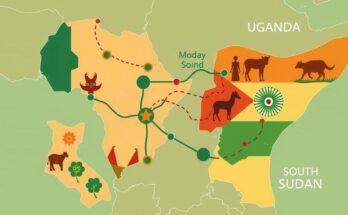South African peacekeepers have been killed in intensified fighting in the DRC, where M23 rebels are advancing towards Goma, despite international calls for peace. The UN has initiated evacuations, and countries have warned their citizens to leave Goma as the humanitarian crisis escalates. The conflict is rooted in long-standing tensions and has displaced hundreds of thousands of people.
Three South African peacekeepers have tragically lost their lives amid escalating violence in eastern Democratic Republic of Congo (DRC), where fighting has recently escalated between the Congolese military and M23 rebels allegedly supported by Rwanda. Despite international calls for the M23 to cease its offensive towards the strategic city of Goma, hostilities continue to intensify, leading to concerns about further humanitarian crises.
The situation in Goma remains tense, with artillery fire audible in the city despite daily life seemingly persisting. As fighting erupted intensely around Goma, the European Union urged the M23 to halt its progress and condemned Rwanda’s military actions, stating that they violate international law and jeopardize regional stability. Recently, Angolan President Joao Lourenco criticized M23’s actions, labeling them as irresponsible.
In light of the deteriorating conditions, the United Nations has begun evacuating non-essential personnel from Goma as several countries, including Britain and the United States, have urged their citizens to leave. The United Nations Mission in the DRC (MONUSCO) has reported heavy engagement in combat and has taken measures to defend against M23 forces. Three South African military personnel were confirmed killed during an M23 offensive in Sake, exacerbating the tragic loss of life in the ongoing conflict.
An emergency meeting of the UN Security Council is scheduled to address the crisis. Disturbingly, over a hundred individuals have been injured since Thursday, necessitating medical attention, while the UN indicates that conflict has displaced around 400,000 people since the start of the year. Goma has long been a focal point of conflict, having previously fallen to M23 control in 2012 before being reclaimed by government forces and MONUSCO.
Attempts to mediate the situation have, unfortunately, been unsuccessful. Previous diplomatic engagements have collapsed due to a lack of consensus between key parties, notably between the DRC and Rwanda. The crisis, bolstered by the presence of Rwandan soldiers supporting M23, continues to threaten humanitarian stability in the region. Despite multiple ceasefires being declared, the cycle of violence persists, drawing attention from broader international efforts to stabilize Eastern Africa.
The conflict in the DRC has a complex history rooted in ethnic tensions, resource exploitation, and geopolitical disputes, particularly concerning Rwanda’s involvement. The M23 rebel group, originally formed from former soldiers of the Congolese army, has consistently posed a significant threat to stability in the eastern DRC. Over the past decades, the eastern regions have experienced numerous violent outbreaks, leading to mass displacements and humanitarian crises. Current tensions escalated following the breakdown of peace talks led by Angola. With over 15,000 peacekeepers stationed in the DRC, including a significant South African contingent, the international community remains concerned about rising casualties and the need for immediate intervention to prevent exacerbating the humanitarian crisis that has plagued the region for years. The situation requires urgent diplomatic attention to promote a sustainable resolution, as the ongoing hostility impacts thousands of civilians and international efforts to restore peace. NATO and other nations are now watching closely as the UN addresses the situation through emergency meetings, highlighting concerns about stability in the region.
The recent deaths of South African peacekeepers in the conflict in the DRC underscore the dire circumstances facing the region, characterized by ongoing violence instigated by M23 rebels and exacerbated by external military support. With an increasing humanitarian crisis and international condemnation of Rwanda’s involvement, it is imperative that diplomatic initiatives be prioritized to bring about a resolution. The UN’s involvement and calls for evacuation reflect the urgent need for effective measures to restore peace, safeguard civilians, and address the humanitarian impacts of this protracted conflict.
Original Source: www.france24.com




